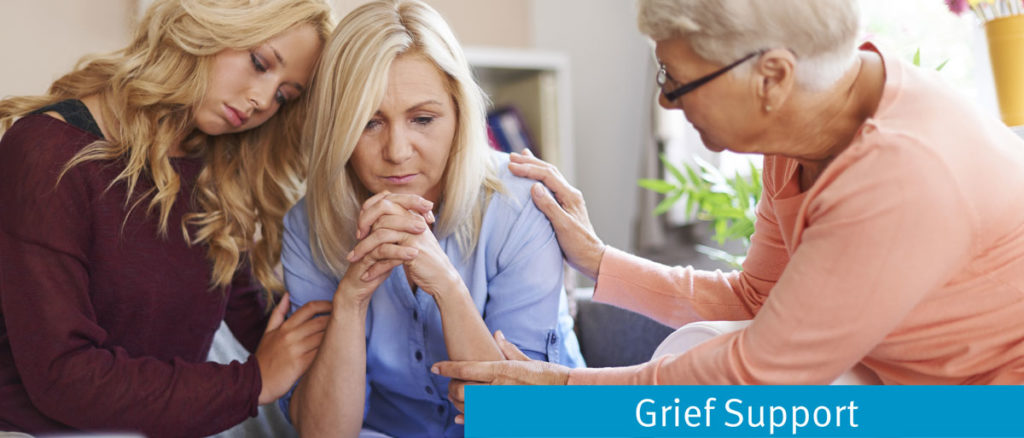
At Ohio’s Hospice Loving Care, we’ll help you find the solutions.
We know the weight of loss is difficult for many to bear. We provide grief support to family and friends of hospice patients who die. This support also extends to community members struggling with grief from the loss of friends and neighbors who were in hospice.
Grief is a normal experience with physical and emotional reactions a person can expect to feel. Grief can seem disorienting, but there are actions a person can take to help overcome the temporary physical and emotional reactions. Ohio’s Hospice Loving Care offers this resource as an aid for those who will find it helpful.
What you may experience physically
- Tightness in the throat or in the muscles
- Heaviness or pressure in the chest
- Inability to sleep or tendency to oversleep
- Periods of nervousness or even panic
- Lack of desire to eat or desire to over-eat
- Experience of seeing or hearing your loved one who has died
- Headaches, or stomach/intestinal disorders
- Lack of energy
- Inability to concentrate
What you may experience emotionally
- Sadness and/or depression
- Forgetfulness
- Guilt or anger about things that happened or did not happen in the relationship with the deceased
- Anger toward others, toward God, or the deceased
- Crying easily and/or unexpectedly
- Mood swings
- Feelings of discomfort around other people
- Feeling you do not want to be alone
- The sense of feeling lonely even when with a group of people
- A sense of the death being unreal or that it did not actually happen
- Feelings of emptiness or having been cheated
- Haunting thoughts of “if only” things had happened differently
- Fear of what will happen next
- Doubts or questions concerning why the death occurred
- Desire to run away or to become very busy in order to avoid the pain of loss
- Feeling like you’re “going crazy” when overwhelmed with intensity of feeling
- A sense of relief that your loved one is no longer suffering
There are actions you can take for physical relief and healing
- Take care of yourself physically by having a check-up with your family physician.
- If you lack a normal appetite, try to eat small, healthy snacks. As your appetite returns, eat a healthy, well-balanced diet.
- Get some exercise-even a peaceful, quiet walk. Physical exercise can help relax you.
- It may be helpful to decrease caffeine intake; caffeine can increase anxiety.
- Beware of alcohol, which is a depressant. Some findings indicate that alcohol interrupts normal sleep patterns.
- Check frequently that you have balance in your life: rest, recreation, prayer/meditation and work.
What you can do for emotional relief and healing
- Be gentle with yourself. Although you may often feel overwhelmed, remind yourself that what you are going through is normal.
- Reach out to others. It is important to find friends you can talk to. Sharing your feelings and experiences with someone can be especially helpful.
- Tell and re-tell what happened to remember things about your loved one and the experience of their death. Sharing good memories also is very important.
- Be aware that people grieve in different ways. Do not measure your progress in handling grief against how others are grieving.
- You may or may not cry often, but when you do, realize that it can be therapeutic. Do not fight the tears. As the author Jean G. Jones says: “Cry when you have to and laugh when you can.”
- Confront guilt by realizing we often do the best we can with the knowledge and resources we have at the time. Talk about your feelings of guilt with someone you trust.
- Become familiar with the normal experiences of grieving and be willing to reflect on how you are experiencing your own grief.
- Remember that grieving takes time, and that experiences and emotions can recur. Be patient with yourself, and allow yourself to heal at your own pace.
- Beware of being critical of yourself, either consciously or unconsciously, due to unrealistic expectations.
- Other events in your life may also bring feelings of loss or stress. These could include family conflicts, health problems, another loss due to death. Realize this happens to many grieving people, and these situations can complicate the grieving process.
- Find support from both inside and outside your family. Do not expect your family to meet all of your needs. Remember that they, too, are struggling with their own grief.
- Many of us think, “I can handle this on my own.” We find it difficult to ask for help. Yet, we all need support. Take the risk of joining a support group. Asking for help from caring people can make a big difference in working through your grief.
- It may be time to start new life patterns. In the past, you may have tried to handle grief with a busy schedule. If your previous style of grieving has not been helpful, be willing to try new approaches. Become active in a support group. Find telephone friends. Some people find relief writing a blog describing their experience. Read and learn about grief. Develop new coping skills. Reach out and help others. Hold on to hope!
The Loving Care Bereavement Program
- The agency provides support to their friends and family of the former hospice patient for 13 months after their loved one passes. This program is optional for family. They have an opportunity to decline this service if they feel they do not need it. However, if later they would like to have the bereavement services, they can call either the London or Marysville office and ask for a member of the bereavement team.
- The bereavement program includes mailings, care notes, phone calls and visits as desired for those who participate.
GRIEF 101: A BASIC PRIMER
Bereavement means that we are deprived, robbed or stripped of someone or something of high personal value. In other words, it’s the objective state of having suffered a loss.
Grief refers to our internal and external reactions to loss.
Mourning is the way in which we express our grief.
GRIEF IS A NATURAL RESPONSE TO LOSS and a normal consequence of our ability to love, connect, and live fully. We do not grieve that which isn’t important to us. It is the link between loss and moving forward.
GRIEF IS EXPERIENCED AT MULTIPLE LEVELS. It affects us physically as well as emotionally and spiritually and impacts our thinking and behavior.
THERE IS NO ONE RIGHT WAY TO GRIEVE. Response to loss is highly individual, based on personality, life experience, personal beliefs and expectations, as well as other factors unique to the individual and their relationship with whom or what is lost. Everyone grieves in his or her own way.
GRIEF CAN BE EXHAUSTING. The energy that grief requires takes its toll in fatigue, irritability, and forgetfulness. Attention to the basics of self-care—health, nutrition, rest, and exercise— facilitates the healing process.
FLUCTUATION IN FEELINGS, ENERGY AND COPING IS TO BE EXPECTED. The ups and downs are often unpredictable and are a normal part of the grief experience.
THERE IS NO TIMETABLE FOR GRIEF. It takes as long as it takes. While the intense pain that often accompanies acute grief may be expected to abate over time, there will always be times when the loss is remembered, missed and grieved.
CHILDREN DO GRIEVE ALTHOUGH THEY EXPRESS IT DIFFERENTLY THAN ADULTS. Their reaction to loss and understanding will differ according to age and development. Age appropriate information about death and grief coupled with sensitive support can help.
KNOWING THAT THERE ARE WIDE VARIATIONS IN WHAT IS “NORMAL” CAN HELP. Inaccurate or faulty information about the grieving process leads to unrealistic expectations, which can unnecessarily add to pain and suffering.
GRIEF IMPACTS NOT ONLY THE INDIVIDUALS DIRECTLY INVOLVED, but also their social connections and support system. Relationships are changed after loss, and it is normal to reassess, change or even end some relationships.
GRIEVING PEOPLE SOMETIMES NEED TO LOOK OUTSIDE THEIR USUAL SUPPORT SYSTEM to find the understanding and information they need. Grief or other support groups, books, internet resources, and professional counseling can be of benefit.

